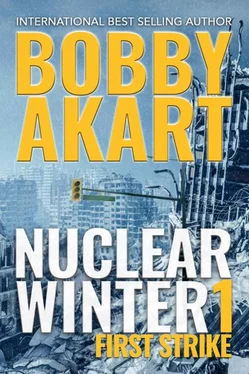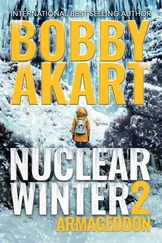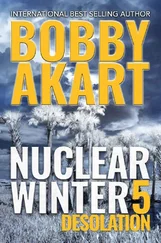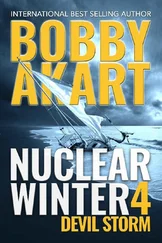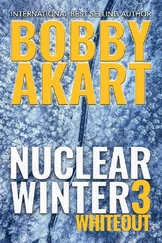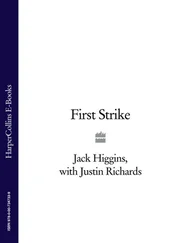Had the attack occurred a day later, the USS Georgia would’ve been positioned in the middle of the Persian Gulf and ready to join the fight. The Nimitz Carrier Strike Group, steaming toward the region, was still a day away. Had it been in position, there would no longer be an Iranian Navy, assuming the president gave the order to join the fray.
The level of stress in the White House was at its highest since the days of the Cuban Missile Crisis. The Kennedy administration had engaged in a thirteen-day political and military standoff with Nikita Khrushchev and the Soviet Union in October of 1962.
The U.S.S.R. had attempted to deliver nukes to Cuba, but not in the same manner of delivery as Iran and Israel exchanged. As Soviet ships steamed toward the tiny island nation just ninety miles from the Florida Keys, the U.S. moved into position to initiate a blockade in their path. The world held its breath as the nations came to the brink of all-out nuclear war. The standoff ended, in that instance, with diplomacy.
It was a different world now. In 1962, only two nations maintained nuclear stockpiles. Today, there were ten countries—the U.S., the UK, Russia, France, China, Pakistan, India, Israel, North Korea, and, with help from its allies, Iran.
In theory, any nation with the technology, intelligence, and facilities could develop nuclear weapons. Nations like Russia, China, and North Korea had been accused of facilitating the development of nuclear programs in Iran and, most recently, in Syria. It had also been rumored that China and Russia had worked with Venezuelan dictators to position nuclear warheads on the South American continent.
A new arms race had begun as the mid-twenty-first century approached. Nonproliferation agreements designed to prevent the spread of nuclear weapons and promote disarmament had been mothballed. The illusion of a world free of nuclear weapons had faded of late. Now the hope of them never being used had been dashed.
President Carter Helton had a concerned look on his face as he was ushered by Secret Service personnel through the bowels of the East Wing of the White House into the Presidential Emergency Operations Center, more widely known by its acronym—PEOC.
In the early years of the Cold War, beginning in the 1950s and continuing through the Reagan administration of the ’80s, America’s defense warning system evolved from duck-and-cover protocols to advanced computerized responses being initiated to defend the nation’s citizens and prepare the military for an attack.
The wholly underground facility, initially constructed during the Roosevelt administration, had undergone substantial changes over many decades so that it was impenetrable to any form of nuclear missile threat.
The president glanced up at the low-hanging ceilings and the elaborate network of pipe that contained hardened wiring designed to protect the facility’s electronics from an electromagnetic pulse attack. In the event of a nuclear-delivered electromagnetic pulse, the PEOC’s communications and mechanical equipment wouldn’t be destroyed by a massive burst of energy known to destroy or disable anything electronic.
The president was escorted through the final stretch of tile-covered hallways into a reception area. Several members of his national defense team had gathered in the small conference room near the entryway. He nodded his head toward them and managed a slight wave, but was abruptly pulled away by Secret Service toward a large room that adjoined the main command and control center of the PEOC.
Harrison Chandler, his chief of staff, and several aides and uniformed members of the military were huddled around the long rectangular table. He was the first to notice President Helton enter the room.
“Mr. President!”
Everyone came to attention and stood to the side so the president could make direct contact with his chief of staff.
“Talk to me, Harrison. What the hell happened?”
Chandler gestured toward a chair at the head of the conference room table, but the president didn’t move. He glanced through the large one-way mirror that overlooked the PEOC’s nerve center, the equivalent of the Situation Room that was located below the Oval Office in the West Wing, only much larger.
He folded his arms and stared at his chief of staff, which was his nature, a posture that often intimidated those locked in the president’s dark eyes.
“Mr. President, we are still awaiting details from our recon satellites. We’ve analyzed video obtained from the news networks, as well as footage provided to us by Israel. It’s apparent that in revenge for the killings at Isfahan, Iran chose to retaliate with several nuclear warheads attached to their Russian-designed ballistic missiles.”
“They had no proof Israel was behind that attack! You solve these matters through diplomacy, not firing off nukes.” The president was incensed.
Chandler moved on with his explanation. “Israel’s defenses worked, although parts of Tel Aviv and Haifa to the north were both struck. We have reports of extensive damage and mass casualties.”
“Israel retaliated?” the president asked.
“In a big way, sir. Tehran was mostly leveled.”
“I take it they’ve stopped.”
“Yes, sir. At least with respect to the nukes. Iran is still active military. If I may, please let me defer to the Pentagon on this.” Chandler motioned to the Pentagon’s representative to brief the president on Iran’s naval blockade and other troop movements.
After he finished his portion of the briefing, Chandler brought the White House communications team into the conversation.
“Mr. President,” the communications director began, “we’re under tremendous pressure to comment on our response.”
President Helton, who’d stood for the entire briefing with his arms crossed, nodded and spread his hands apart. “Of course. Of course. Naturally, we’re saddened by the loss of life, and we strongly condemn the actions of the Iranian regime. There is no place in our civilized world for the use of nuclear weapons.”
“Yes, sir. I understand. However, the pressure relates to what actions we plan on taking to defend our closest ally in the Middle East—Israel. The media wants to know whether we are going to declare war on Iran and enter the Persian Gulf to restore order. Also, they want to know if we’re willing to state unequivocally that our use of nuclear weapons in response is off the table.”
The president shook his head in disbelief. Only hours ago, two nations had devastated one another with nuclear missiles, and the media wanted to know if America was prepared to fire off a few more. This was going to be a long day.
Sunday, October 20
Washington Times
Washington, DC
Every young person who dreamed of becoming a journalist enjoyed seeing a vintage, yellowing photograph of the city desk of a newsroom from the mid-twentieth century. Scrambling to put together the afternoon paper, a once-grand tradition in America, had gone the way of manual typewriters and carbon paper. Gone were the tape recorders and spiral notebooks. Editing consisted of retyping whole paragraphs and pasting them on top of the material to be deleted. There were no computers or internet or smartphones to record news in real time.
Newsrooms were filled with furnishings that looked like they’d been picked up at a garage sale. Scarred wooden desks were covered with papers and perhaps a nondescript desk lamp. To the side, perched on a rolling table, was a manual typewriter made by companies like Royal and Smith-Corona. Reporters who were assigned to the field or to travel with a high-ranking government official were assigned a Remington Portable, which was basically a typewriter in a box.
Читать дальше
